ESA Student Section Awardees
2024 Awardees
Trailblazing Diversity and Inclusion:
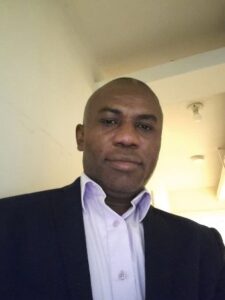
Evald Maceno, University of Puerto Rico
Evald Maceno, a PhD Candidate in Environmental Science at the University of Puerto Rico studies seasonal and interannual patterns of reproduction in tropical forests in relation to hurricanes, drought, and mast reproduction. His research has three primary objectives: (1) Determine the influence of plant functional traits associated with seasonal timing of flowering and fruiting and (2) Determine the proximate environmental cues that trigger flowering and control timing of reproduction in tropical forests and (3) Assess masting behavior in tropical forests. Each of these objectives will enhance our understanding of the ecology of tropical forest reproduction and its sensitivity to climate change. He works with large data sets gathered from large forest dynamics plots in the tropical regions. He focuses on multi-decadal data sets of tropical tree reproduction, especially 30+ years of phenological records from Luquillo in Puerto Rico, Barro Colorado Island (BCI) and Yasuni in Ecuador. He is testing a few quantitative methods on mast reproduction and conducting cross-sites analyses as an innovative approach in this field. He is currently conducting phenological sampling for a large plant community in Luquillo Experimental Forest in Puerto Rico to contribute to our long-term dataset. Luquillo has spent more than 30 years studying phenology in the forest. Maceno was one of the awardees of the 2023 J&J Ruinen fellow in tropical forestry with ForestGEO. He is a current fellow at Long-Term Ecological Research Program (LTER) and was a recipient of JT Callahan Memorial Student travel award from the Ecological Society of America (ESA) last year. In recognition of his contributions and unwavering dedication in his field he is honored with the student Trailblazing Award.
Trailblazing Community & Outreach:
Abigail Lewis, Virginia Tech
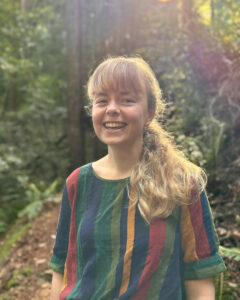
Abigail Lewis is an ecosystem ecologist working to forecast future changes in the biogeochemistry of lakes and wetlands. She received her Ph.D. from Virginia Tech in May 2024 and has recently begun a postdoctoral Climate Change Fellowship at the Smithsonian Environmental Research Center. Abby’s dissertation research assessed the causes and consequences of changing oxygen dynamics in the bottom waters of lakes, with analyses including whole-ecosystem experiments in a single lake and data analysis across >600 lakes worldwide. Her research is made actionable through science outreach over local to global scales. As one notable example, Abby co-led the development of a successful Flipped Science Fair outreach program, where children judged 27 graduate student science fair posters. Her work is supported by fellowships and awards including the National Science Foundation Graduate Research Fellowship Program, the ESA Katherine S. McCarter Graduate Student Policy Award, and the Virginia Tech College of Science Outstanding Doctoral Student Award.
Trailblazing Ecology Publication Award:
Joanna Tang, University of California Santa Barbara
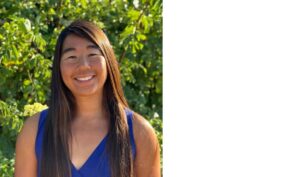
Joanna is finishing her PhD at University of California, Santa Barbara, this summer! She studies habitat restoration under Dr. Carla D’Antonio. Her research uses ecological theory to develop innovative restoration methods, specifically for urban vernal pool wetlands. To this end, she collaborates with local restoration organizations and land managers to develop restoration techniques that can be tested and then implemented directly on local ecosystems. Her research focuses on long-term monitoring and management strategies, and her first paper, “Reinvasion of restored California vernal pools reveals the importance of long-term restoration planning”, was published in Restoration Ecology last year. Her research advances the field of ecology by supporting a paradigm shift away from viewing restoration as a short-term intervention and toward viewing restoration as an ongoing symbiotic relationship between humans and plants. She believes this relationship is for everyone at any age, which is why she includes undergraduate students and community members in her research, started an ESA SEEDS chapter, and also launched a science research podcast called “The Environment of it All”.
Trailblazing Education Award:
Ashmita Das, State University of New York
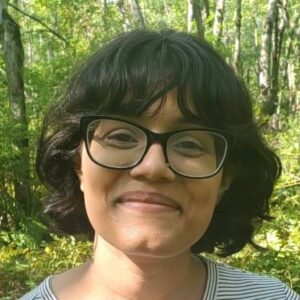
Ashmita Das is a Ph.D. candidate in the Department of Environmental Science at SUNY College of Environmental Science and Forestry (SUNY ESF). Broadly, her research interests revolve around exploring the interrelationships between social and ecological dimensions of sustainable agriculture, including how key stakeholders’ values, worldviews, and epistemologies influence what, where, how, why, and by who particular crops are cultivated. Her current dissertation research, supported by funding from the National Science Foundation, investigates how narratives around the potential complementarity of gene editing tools like CRISPR-Cas9 and the goals of alternative food movements like agroecology are constructed, communicated, and contested by different networks of actors. Ashmita is also interested in ecological pedagogy, especially strategies for incorporating experiential learning and interdisciplinarity into how we communicate about complex environmental issues. One example of how she has worked towards this is by co-designing a freely available board game called “Companion: An Agroecological Adventure”, which aims to teach players about the social and ecological characteristics of sustainable agroecosystems in
an accessible and engaging way. Ashmita holds an M.S. in Environmental Science from SUNY ESF and a B.S. in Environmental Science from SUNY Binghamton. Prior to beginning graduate school, Ashmita also worked as an urban environmental educator at Cornell Cooperative Extension of Onondaga County.
Trailblazing Graduate Research Award:
Anna Crofts, University of Sherbrooke
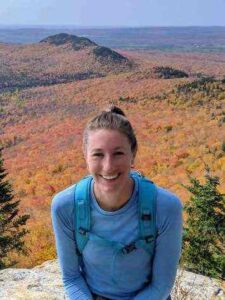
Anna Crofts is a PhD candidate at the University of Sherbrooke, Quebec, Canada. Her research applies imaging spectroscopy to examine the organization and functioning of tree communities in the Northern Temperate forest. She demonstrates that this emerging technology can be used to quantify tree community properties continuously across large spatial extents – opening the door for the broader application of this novel data. Her research then applies imaging spectroscopy data to examine fundamental community ecology questions. Check out her website and ResearchGate
2023 Awardees
Trailblazing Diversity and Inclusion
Marianne Bello, Rio de Janeiro State University
 Marianne Bello is a Ph.D. candidate at the State University of El Rio de Janeiro and is being recognized for her Trailblazing Work in Diversity & Inclusion. Her efforts focus on identifying affirmative actions and Brazilian narratives of Black representation in Science. Bello co-created the Odu initiative, a mentoring program that provides emotional and practical support to black studies in science. The initiative also invites communities to reflect on building science with greater diversity, equity, and inclusion. Her current research is focused on understanding the behaviors, vulnerability, and effects of the southern howler monkey, an endangered primate species susceptible to the yellow fever virus using populational techniques. She is currently active on Instagram, LinkedIn, and Twitter.
Marianne Bello is a Ph.D. candidate at the State University of El Rio de Janeiro and is being recognized for her Trailblazing Work in Diversity & Inclusion. Her efforts focus on identifying affirmative actions and Brazilian narratives of Black representation in Science. Bello co-created the Odu initiative, a mentoring program that provides emotional and practical support to black studies in science. The initiative also invites communities to reflect on building science with greater diversity, equity, and inclusion. Her current research is focused on understanding the behaviors, vulnerability, and effects of the southern howler monkey, an endangered primate species susceptible to the yellow fever virus using populational techniques. She is currently active on Instagram, LinkedIn, and Twitter.
Trailblazing Community & Outreach
Ellen Danford, Ohio State University
 Ellen Danford is our Trailblazing Work in Community Outreach and Science Communication Awardee. She is currently a Master’s Student at Ohio State University. Throughout her research of urban pollinator ecology, she has been able to effectively communicate to different people the science and behavior behind pollinators and how to recognize them in their urban surroundings. In addition, her research on income-based plant communities is pivotal to understanding that plant communities can be a proxy of wealth in cities, an area where greenery is so crucial. Moreover, Ellen is an avid educator, she has sought to teach different stakeholders how to maintain green spaces in cities and how to use that as an instrument for fostering community and education. Ellen is active on LinkedIn and her website.
Ellen Danford is our Trailblazing Work in Community Outreach and Science Communication Awardee. She is currently a Master’s Student at Ohio State University. Throughout her research of urban pollinator ecology, she has been able to effectively communicate to different people the science and behavior behind pollinators and how to recognize them in their urban surroundings. In addition, her research on income-based plant communities is pivotal to understanding that plant communities can be a proxy of wealth in cities, an area where greenery is so crucial. Moreover, Ellen is an avid educator, she has sought to teach different stakeholders how to maintain green spaces in cities and how to use that as an instrument for fostering community and education. Ellen is active on LinkedIn and her website.
Trailblazing Ecology Publication Award
Nikunj Goel, University of Texas-Austin
 Nikunj Goel is a Ph.D. candidate at the University of Texas-Austin and was awarded our Trailblazing Ecology Publication Award. Throughout his undergraduate studies, Nikunj was able to co-author various publications, allowing him rigorous experience in effectively communicating science. The publication that allowed Nikunj to be recognized for this award is titled Dispersal Limitation and Fire feedbacks maintain mesic savannas in Madagascar (2020). He is socially active on Twitter and you can find his publication here.
Nikunj Goel is a Ph.D. candidate at the University of Texas-Austin and was awarded our Trailblazing Ecology Publication Award. Throughout his undergraduate studies, Nikunj was able to co-author various publications, allowing him rigorous experience in effectively communicating science. The publication that allowed Nikunj to be recognized for this award is titled Dispersal Limitation and Fire feedbacks maintain mesic savannas in Madagascar (2020). He is socially active on Twitter and you can find his publication here.
Trailblazing Education Award
Taylor Zallek, University of Pittsburg
 Taylor Zallek, Ph.D. candidate at the University of Pittsburgh, is recognized for his Trailblazing Work in Education. Taylor’s research is focused on invasion ecology, which is a very misunderstood science from a stakeholder perspective. His work includes contributing a laboratory experience for all ages called Duckweed Survivor, developing curricula for high school students, and co-authoring Open Educational Resource Textbook– a free book that incorporates coding exercises, spotlights different ecologists, and works on environmental justice. Taylor can be found on Twitter.
Taylor Zallek, Ph.D. candidate at the University of Pittsburgh, is recognized for his Trailblazing Work in Education. Taylor’s research is focused on invasion ecology, which is a very misunderstood science from a stakeholder perspective. His work includes contributing a laboratory experience for all ages called Duckweed Survivor, developing curricula for high school students, and co-authoring Open Educational Resource Textbook– a free book that incorporates coding exercises, spotlights different ecologists, and works on environmental justice. Taylor can be found on Twitter.
Trailblazing Graduate Research Award
Arthur Lamounier-Moura, Auburn University
 Arthur Lamounier Moura is a Ph.D. candidate at Auburn University, where he focuses on forest species composition in fire-based ecosystems in the southern United States. Arthur’s academic career has spanned almost a decade. Throughout this time, he participated in Science Without Borders, interned at the Museum of Chicago, and completed a Master’s degree at the Federal University of Minas Gerais, among others. He has been awarded our Trailblazing Award on Graduate Research for his research at Auburn University which evaluates the effects of increasing fire frequency on plant communities of the Cerrado biome. He is currently active on Researchgate.
Arthur Lamounier Moura is a Ph.D. candidate at Auburn University, where he focuses on forest species composition in fire-based ecosystems in the southern United States. Arthur’s academic career has spanned almost a decade. Throughout this time, he participated in Science Without Borders, interned at the Museum of Chicago, and completed a Master’s degree at the Federal University of Minas Gerais, among others. He has been awarded our Trailblazing Award on Graduate Research for his research at Auburn University which evaluates the effects of increasing fire frequency on plant communities of the Cerrado biome. He is currently active on Researchgate.
2020 Awardees
Trailblazing Undergraduate Research
Ajisha Alwin, University of Florida

Through her research, she has contributed to the need for research to be done on careers in field research by exploring the alignment between employer expectations and the skills of incoming graduates. And she hopes that the study will serve as a reference for educators, students, and employers by offering insight into the relationship between student skills and employer expectations within the framework of workforce preparation.
“As a student who is undergoing the same process trying to navigate a research career, my aspiration is to research and educate students of the expectations, qualifications, and availability of research opportunities in the field of ecology”
Trailblazing Graduate Research
Mauna Dasari, University of Notre Dame

My research will contribute the first prospective longitudinal data set able to test how gut microbial dynamics vary between individuals and what consequences this variation may have for host development and fitness. This contribution will be significant because it will provide foundational knowledge for understanding what features define healthy microbiomes as well as how these features predict biodemographic markers of host health, including the timing of development, fertility, and survival.
“As a woman in science and women of color underrepresented in ecology and evolution, I have strived to be a relatable role model working to create a more inclusive environment for the next generation of scientists at every level of my community, and beyond”
Trailblazing Ecology Publication
Chuliang Song, Massachusetts Institute of Technology

His publication focuses on Modern Coexistence Theory (MCT) which is a leading theoretical framework for studying the coexistence of competing species.
“We present an overlooked but important property of MCT, along with two key new results and their consequences. The overlooked property is that stabilizing mechanisms (increasing species’ niche differences) and equalizing mechanisms (reducing species’ fitness differences) have two distinct sets of meanings within MCT: one in a two-species context and another in a general multispecies context. We demonstrate that the two-species framework is not a special case of the multispecies one, and therefore these two parallel frameworks must be studied independently”.
Trailblazing Work in Diversity Inclusion
Micah Miles, University of Georgia

“In my diversity and inclusion work, I broadly seek to connect insights and opportunities within ecology and scientific community at large to the marginalized communities that have been systematically underserved. From fine-scale engagement with youth and local community members to science communication content creation and dissemination on widely accessible social media platforms, I strive to develop and deliver the kind of inclusive ecological outreach that might inspire the next generation of environmental stewards. To this end, my work ultimately supports the impact of ecological research, by navigating through the paywalls and jargon of publications, to stimulate interest in and appreciation for the field of ecology across a wider and more diverse spectrum of potential future-ecologists”
Trailblazing Work in Science Communication
Mia Howard, Cornell University

Her main outreach activity has been a distance-learning science education program that she created for people incarcerated in prisons across the United States through the Prisoner Express Program at Durland Alternatives Library.
“While science communication is a useful skill in and of itself, I think that actually being able to share students’ writing with an audience that is hungry to learn about science is not only great motivation for students but also teaches them the importance of scientific outreach, especially with nontraditional audiences”.
Trailblazing Work in Education
Kabryn Mattison, Appalachian State University

Her most recent work in the field of Ecology Education is investigating eco-grief within learning environments, and advocating for structural changes within my university, community, and eventually the ecological field as a whole.
“I want to use my voice to open up the conversation around mental health in STEM and the impacts of eco-grief on working scientists and students alike. I am unafraid of sharing my work and experiences vulnerably in order to better support those who may not be able to speak about their experiences for various structural and personal reasons. Through my own personal experiences navigating eco-grief felt due to ecological education and work within the Anthropocene, I hope to shed a much-needed light on an issue currently hidden in the darkness of taboo and shame”